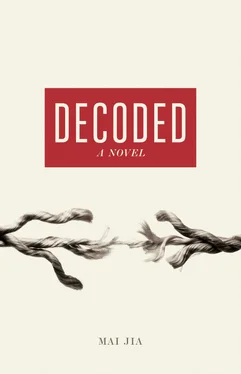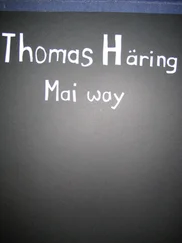Mai Jia - Decoded
Здесь есть возможность читать онлайн «Mai Jia - Decoded» весь текст электронной книги совершенно бесплатно (целиком полную версию без сокращений). В некоторых случаях можно слушать аудио, скачать через торрент в формате fb2 и присутствует краткое содержание. Год выпуска: 2014, Издательство: Allen Lane, Жанр: Современная проза, на английском языке. Описание произведения, (предисловие) а так же отзывы посетителей доступны на портале библиотеки ЛибКат.
- Название:Decoded
- Автор:
- Издательство:Allen Lane
- Жанр:
- Год:2014
- ISBN:нет данных
- Рейтинг книги:3 / 5. Голосов: 1
-
Избранное:Добавить в избранное
- Отзывы:
-
Ваша оценка:
- 60
- 1
- 2
- 3
- 4
- 5
Decoded: краткое содержание, описание и аннотация
Предлагаем к чтению аннотацию, описание, краткое содержание или предисловие (зависит от того, что написал сам автор книги «Decoded»). Если вы не нашли необходимую информацию о книге — напишите в комментариях, мы постараемся отыскать её.
Decoded — читать онлайн бесплатно полную книгу (весь текст) целиком
Ниже представлен текст книги, разбитый по страницам. Система сохранения места последней прочитанной страницы, позволяет с удобством читать онлайн бесплатно книгу «Decoded», без необходимости каждый раз заново искать на чём Вы остановились. Поставьте закладку, и сможете в любой момент перейти на страницу, на которой закончили чтение.
Интервал:
Закладка:
Still, Rong Jinzhen dreamed a great deal. He had taken everything from this world and experienced it in his dreams. In a sense, he had two worlds of existence: one real, the other a dream. People say that everything on land is also in the sea, but not everything in the sea is on land. Rong Jinzhen’s situation paralleled this: the things he had in his dreams did not necessarily exist in the real world, but everything from the real world was most certainly to be found in his dreams. I guess you could say that for Rong Jinzhen everything possessed a duality: on the one hand was reality — the realness of things, the living world; on the other, the dream, virtuality, chaos. As the idiom ‘baseless gossip’ suggests, we only accept the real world as evidence. But for Rong Jinzhen, there was always a duality: the real and the dream, and only he knew of the latter. It goes without saying that his dream world was more absurd, more incoherent than reality. . [To be continued]
Now, a more tranquil Rong Jinzhen realized that to hope for someone else to offer advice on how to decipher BLACK, to hope that someone else could put him on the correct path — that was just nonsense from his dreams, an absurdity within an absurdity. To console himself he reiterated, ‘Don’t count on anyone but yourself, don’t hope for someone else to help; they cannot tell you the right path, it’s not possible, not possible. . ’ He repeated this to himself, believing perhaps that such a mantra might make him forget the disappointment of the conference.
As it turned out, reciting this mantra did in fact make him feel better; it was not entirely without benefit. Rong Jinzhen was able to find some reassurances in it; four in fact:
1. Attendance at the conference allowed him to see that the Head of the Intelligence Services was immensely concerned about the progress made towards deciphering BLACK and the future thereafter. This made Rong Jinzhen feel somewhat stressed, but it also encouraged him, urging him on in his attempt to decrypt the cipher.
2. Attendance at the conference also allowed him to witness how nearly everyone in his profession fawned over him, either in speech or by deed (say for instance by shaking his hand overly affectionately, or by bowing at the waist instead of just a nod, or by politely smiling at everything he said, and so on). Rong Jinzhen had discovered that in their secretive world, he was a celebrity, loved by all. Before he had had some awareness of this but had never really been sure. Now that he knew, he couldn’t help but be a little cheered by it.
3. At the first drinks reception of the conference, the elderly statesman had made an impromptu promise to provide Rong Jinzhen with an incredibly sophisticated calculator, capable of over 40,000 calculations. Such a gift would be tantamount to providing Jinzhen with an internationally top-ranked assistant!
4. Before leaving, he had bought from the Yesterday Bookstore two books he had long desired, one being The Riddle (a translation of The Writing of the Gods by the famous cryptanalyst Klaus Johannes).
In sum, then, what makes a trip worthwhile?
For Rong Jinzhen, it was getting these particular items. With these in hand, Rong could happily head back to Unit 701. The train ride home would be free of incident, and free too of men hiding in shadows. Vasili would have no difficulty in booking a soft sleeper car for the journey. Once on board, Rong Jinzhen felt at ease, in total contrast to the journey six days before.
He really was quite happy to be departing the capital. Another reason for this happiness was that the night before leaving, the city had received its first winter snowfall, almost as though it had been arranged as a special send-off for this man from the south. The snow had fallen intensely, blanketing the ground, brightening the darkness. In this wintry setting, Rong Jinzhen waited for the train to depart. The silence of the falling snow and the scent of moisture it carried in the air filled his heart with peace; it was a splendid daydream.
Such a start would have satisfied even the fussiest of people, making Rong Jinzhen feel quite confident that this would be a relaxing journey home.
But what happened was anything but.
3
The trip home was completely different. For one thing, it was two days and three nights, whereas the train to Beijing took three days and two nights. Two of the nights had already passed, and the second day was in the midst of dying away. Except for sleeping, Rong Jinzhen spent his time reading his newly purchased books. It was quite obvious that he felt nothing of the anxiety or fear that had marred his previous train ride. The fact that he could sleep well and enjoy reading was proof enough. A journey home has certain advantages. For their party this was especially so since they had been able to get a sleeper car that had its own independent heating unit, which somewhat separated their berth from the rest, making it a more secure location. Rong Jinzhen couldn’t help but feel rather pleased and happy about their good fortune in getting such a car.
No one can deny that for a man who lacks courage, who is overly sensitive and rather cold and detached, to be removed from close proximity to others is a most pressing desire, an overriding concern. At Unit 701, Rong Jinzhen was always taciturn and uncommunicative, always aloof from the world around him. This was how he maintained his distance from people, how he separated himself from the crowd. Whichever way you looked at it, his motivation for befriending the chess-playing lunatic must have been to ensure his own ostracism from everyone else. To associate with the lunatic was the best means to make sure that he was left alone. He had no friends and no one tried to be his friend: they respected him, they admired him, but they weren’t affectionate towards him. He lived a solitary life (and even the chess-playing lunatic left Unit 701 when his dementia began to come under control). Most people said that he was untouched by the world around him: he never got close to people, and was always alone and rather depressed-looking. But loneliness and depression did not bother him; the greater torment was enduring the myriad idiosyncrasies of other people. From this point of view, he did not much fancy the rank of section chief, or even the title of husband. . [Transcript of the interview with Director Zheng]
Rong Jinzhen got married on the first of August in 1966. His wife’s surname was Di, an orphan who had come to work for us quite early, initially as a telephone switchboard operator. In 1964 she was transferred to the cryptography section as a security officer. She was a northerner, rather tall — half a head above Rong Jinzhen — and she had quite large eyes. She spoke a most proper Mandarin Chinese, although she never said very much. When she did, it was in a low tone of voice. Perhaps that was due in large part to her position as a keeper of secrets.
To speak of Rong Jinzhen’s wedding — well, I’ve always felt that it was exceptionally odd, as if fate were teasing him in some way. Why do I say that? It’s because I know that in the beginning there were a great many people who were concerned about his marrying someone. Some even thought that they should propose to him, in an effort to somehow bask in his glory I suppose. And yet maybe not, perhaps it was his own indecisiveness, or some other reason. But whatever the cause, whenever the possibility of marriage arose, he always shut the door. It seemed as though he simply lacked interest in women and marriage. But then later, I don’t know how, and with very little fanfare, he married Miss Di. He was thirty-four at the time. Of course, his age was not an issue, I mean, he was a little old, but if someone was willing to marry him, then what’s the problem? None. The problem came after they were married: BLACK came and stole him away. It goes without saying that if he hadn’t married Miss Di at that time, he would probably never have got married: BLACK would have prevented that. Their wedding gave people an odd feeling, just like when you are about to close a window and a bird abruptly flutters into the room: it’s a little strange and yet it seems almost like fate, and you don’t really know what to do — is it good or bad omen, something right or wrong?
Читать дальшеИнтервал:
Закладка:
Похожие книги на «Decoded»
Представляем Вашему вниманию похожие книги на «Decoded» списком для выбора. Мы отобрали схожую по названию и смыслу литературу в надежде предоставить читателям больше вариантов отыскать новые, интересные, ещё непрочитанные произведения.
Обсуждение, отзывы о книге «Decoded» и просто собственные мнения читателей. Оставьте ваши комментарии, напишите, что Вы думаете о произведении, его смысле или главных героях. Укажите что конкретно понравилось, а что нет, и почему Вы так считаете.












